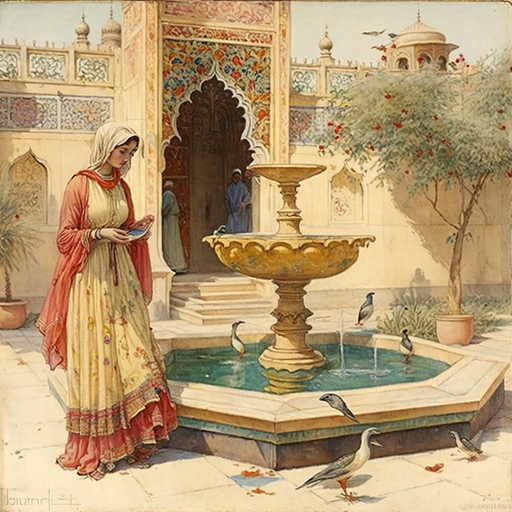“Dust in the Lion’s Paw,” an autobiographical account of Freya Stark’s life during the years 1939-1946, takes its title from the 10th century Persian poet Firdausi’s line, “I am but as dust in the lion’s paw.” In this compelling narrative, Stark episodically recounts her role as an Officer of the British Ministry of Information, spanning across various locations, including southwest Arabia, Egypt, Iraq, the United States, Canada, India, and eventually Italy. At the core of her mission lay the task of propagating British influence in the Middle East. While her primary responsibility was countering hostile Axis propaganda, her work evolved into laying the groundwork for a peaceful post-war era. Stark was tasked with creating an environment conducive to maintaining British influence in the Arab world and India, as the toll of World War II threatened to deplete Britain’s military and financial resources. The pages of her autobiography unveil her fascinating journey and her unwavering dedication to her mission.
Persuasion Over Propaganda
Throughout this autobiography, Freya Stark takes us on a journey that delves deeply into the intricacies of her war work in the Arab world. Her initial steps led her to Yemen, where she laid the foundation for her future endeavours. As her mission unfolded, Stark developed a unique philosophy of action. Rejecting the term “propaganda” as inadequate and misleading, she introduced the term “persuasion” to better capture the essence of her work. Her principles in the art of persuasion were as follows:
- First, she firmly believed in the importance of genuinely embracing her own message.
- Second, she recognized that her message must not only benefit her side but also resonate with her audience’s interests.
- Third, Stark understood the need for indirect influence, where her local allies would disseminate and interpret her words among their people. This strategic approach was grounded in her profound appreciation of the power of words in the exchange of ideas and an unwavering commitment to serve the best interests of her audience, fostering goodwill and trust. Her narrative provides valuable insights into her methodical approach to shaping perceptions and achieving her mission.
The Brotherhood of Freedom: A Beacon of Influence
In the turbulent climate of the early 1940s, Stark’s immediate task was to persuade the young people in the Arab countries to align their interests with those of Britain and its allies amidst the rising tide of nationalism. The future lay in the hands of the passionate youth who were drawn to the banner of nationalism, and Stark recognized that Britain’s best strategy, during and after the war, was to earn the friendship and support of this vital demographic. To this end, she played a pivotal role in founding the Brotherhood of Freedom, a unique organisation built upon the shared religious principles of Christianity and Islam. The Brotherhood operated through tightly-knit committees with volunteers who dedicated their efforts to the cause. These volunteers willingly sacrificed monetary compensation for the opportunity to contribute to their deeply-held beliefs, reinforcing the notion that disinterested service was the most effective way to engage with the local populace.
Egypt: The Epicenter of the Brotherhood’s Expansion
The Brotherhood’s influence spread far and wide, from its modest beginnings in Aden to its remarkable growth in Egypt. In Egypt, the organisation achieved a membership of 60,000, working through over 6,000 committees that had established their presence in towns and villages across the nation. Many of these committees even published leaflets at their own expense, demonstrating their commitment to the cause. Furthermore, seventy smaller committees operated within Cairo’s prestigious al-Azhar University, allowing them to reach an influential audience. This extensive network of committees was not only a testament to the organisation’s reach but also to the deep resonance of their message. The Brotherhood of Freedom remained an active and influential force in the region until it was ultimately suppressed in Egypt due to political changes and evolving circumstances.
Freya Stark’s contributions to the Brotherhood of Freedom played a pivotal role in shaping perceptions and fostering a climate of mutual understanding during a crucial period in the Middle East. Her work serves as a testament to the power of cultural diplomacy and the profound impact it can have in the world of international relations and geopolitics.
Nurturing Friendship Amid Strife
Amidst the turmoil and unrest of World War II, Freya Stark’s role extended far beyond the conventional boundaries of wartime propaganda. In her autobiography, “Dust in the Lion’s Paw,” she eloquently portrays her unyielding commitment to fostering friendship and understanding in a region fraught with tension. Stark recognized that the future of British influence in the Arab world and India depended on forging connections with the youth, the future leaders of the region.
The Resilient Brotherhood of Freedom
The Brotherhood of Freedom, a remarkable creation of Freya Stark, demonstrated remarkable resilience in its pursuit of fostering amicable relations during a challenging era. With an initial membership numbering around 7,000, the organization faced the turmoil of the Rashid ‘Ali revolt in 1941. Despite these adverse circumstances, it persevered in its mission. This section delves into the Brotherhood’s journey, resilience, and its ability to adapt, grow, and spread its message across the Arab world, particularly in Iraq and Egypt.
The Brotherhood’s Demise and Anti-Western Sentiment
The Brotherhood of Freedom remained a vital force, actively pursuing its mission, until it faced its eventual demise. Miss Stark attributes the decline of this influential organisation primarily to British and American policies concerning the emergence of Israel. The British, as the Mandatory Power, had guaranteed the rights and future independence of the Palestinian Arabs in their homeland. However, the inability to fulfil these obligations due to American-supported Zionist resistance created bitterness and fomented anti-Western sentiment throughout the Arab world.
Wit and Exquisite Descriptions: Freya Stark’s Literary Craft
Throughout her autobiography, Freya Stark’s narrative is not only marked by her wit and intellectual depth but also by her mastery of the English language. She adorns her account with humour and light-hearted anecdotes, which offer readers moments of respite amidst the weight of her wartime experiences. Her correspondences, interwoven with the narrative, provide insights into her character and the challenges she faced.
Stark’s vivid descriptions offer readers a visual and sensory journey through the landscapes she traversed. From the “shining” coasts of Syria to the stark beauty of the Palmyrene desert, her prose paints a vibrant and evocative picture. Even while enduring the siege of the British Embassy in Baghdad in 1941, Stark finds solace in appreciating the mesmerising sunrises over the Tigris River, a sight she likens to “metal pouring hurriedly to sea.” In the midst of adversity, she finds solace in the small pleasures of life, exemplified by the “blue fountain [that] shoots up its little splashing grateful sound” in the Embassy garden. Stark’s narrative is, in essence, a literary feast, catering to those with a taste for eloquent storytelling.
A Meaningful Journey for the Initiated
In conclusion, Freya Stark’s autobiography presents a meaningful journey for readers already acquainted with the Arab world and its complexities. Stark’s experiences, marked by her dedication and vision, provide a window into a critical period in the Middle East’s history. Her remarkable story, encompassing her work in the Ministry of Information, the establishment of the Brotherhood of Freedom, and her diplomatic missions in the United States, sheds light on the challenges and opportunities that defined an era. For those initiated into the nuances of the region, Freya Stark’s autobiography offers luminous pearls of wisdom on nearly every page.

